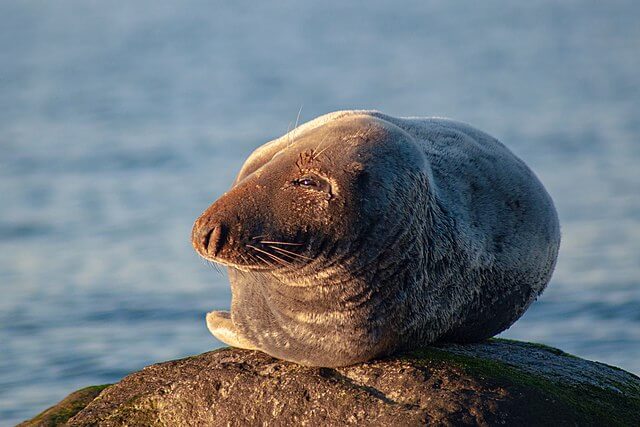
Cumbria Wildlife Trust reports a turbulent year for wildlife in the Irish Sea.
Grey seals exhibited a notable recovery in 2023 following a slight decline in 2022.
Furthermore, the presence of sharks surged, with a 13% increase in egg cases discovered on Walney Island compared to the previous year.
However, the Trust also observed instances of wildlife entangled in fishing gear, underscoring the hazards of marine and beach litter.
A drone survey conducted in January 2023 at South Walney Nature Reserve tallied 466 grey seals, marking the season’s peak count and signalling a robust resurgence from the preceding year’s decline.
The seal colony, burgeoning since the 1980s, witnessed its ninth breeding season in 2023. Notably, nine seal pups were recorded in autumn, contributing to a total of 48 pups since 2015.
Head of Marine at North West Wildlife Trusts Georgia de Jong Cleyndert said: “It’s been a real conservation success story but we face ongoing challenges with disturbances.”
Tragically, instances of marine life casualties were also documented.
An adult seal and a porpoise were discovered washed ashore, potentially victims of boat collisions. Additionally, another adult seal and pup were found deceased simultaneously, with the cause of death undetermined.
Such incidents underscore the vulnerability of marine mammals, particularly during sensitive periods like pup rearing.
Meanwhile, the shark population exhibited growth, evidenced by the discovery of 3,759 discarded egg cases off Biggar Bank, Walney Island.
These cases, attributed to various shark and ray species, reflect an expanding presence along the Cumbrian coast.
However, the proliferation of Pacific oysters, observed on the west and south coast, poses a concerning threat due to their invasive nature, which could disrupt native ecosystems.
In March, a distressing discovery was made at Seascale beach—a young grey seal, potentially originating from the 2022 pup cohort at South Walney, was found entangled in fishing gear, emphasising the ongoing challenges posed by marine debris.
Ms de Jong Cleyndert said: “This gear continues to needlessly catch and kill marine life.
“We run regular beach cleans, why not get involved?”
——————————————————————————
At Natural World Fund, we are passionate about stopping the decline in our wildlife.
The decline in our wildlife is shocking and frightening. Without much more support, many of the animals we know and love will continue in their decline towards extinction.
When you help to restore a patch of degraded land through rewilding to forests, meadows, or wetlands, you have a massive impact on the biodiversity at a local level. You give animals a home and food that they otherwise would not have had, and it has a positive snowball effect on the food chain.
We are convinced that this is much better for the UK than growing lots of fast-growing coniferous trees, solely to remove carbon, that don’t actually help our animals to thrive.
This is why we stand for restoring nature in the UK through responsible rewilding. For us, it is the right thing to do. Let’s do what’s right for nature!
Donate today at https://naturalworldfund.com/ and join in the solution!

